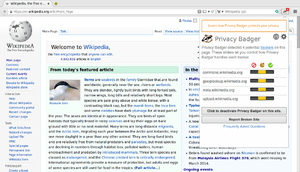Privacy Badger
 | |
 | |
| Developer(s) | Electronic Frontier Foundation |
|---|---|
| Initial release | 1 May 2014[1] |
| Stable release |
2018.4.23
/ 23 April 2018[2] |
| Repository |
|
| Type | Browser extension |
| License | GNU GPL v3[3] |
| Website |
www |
| As of | Aug 2015 |
Privacy Badger is a free and open-source browser extension for Google Chrome, Mozilla Firefox, Opera, and Firefox for Android created by the Electronic Frontier Foundation (EFF).
Its purpose is to promote a balanced approach to internet privacy between consumers and content providers by blocking advertisements and tracking cookies that do not respect the Do Not Track setting in a user's web browser.[4] While some of its code is based on Adblock Plus, Privacy Badger only blocks those ads which come with embedded trackers.[4]
The alpha version was released on 1 May 2014,[1] followed by a beta on 21 July 2014.[5] In April 2017, the EFF announced that Privacy Badger had surpassed one million users.[6]
Description
The EFF states: "If an advertiser seems to be tracking you across multiple websites without your permission, Privacy Badger automatically blocks that advertiser from loading any more content in your browser. To the advertiser, it's like you suddenly disappeared."[7]
Reception
Several publications reported on Privacy Badger in May 2014, following its release.
Ian Paul, for PC World, mentions that Privacy Badger "only blocks third-party tracking, not first party", and mentions that prevention of browser fingerprinting is planned for a future release.[8]
Ars Technica notes that if an advertiser makes a commitment to respect Do Not Track requests, their cookies will be unblocked from Privacy Badger.[9]
Nathan Willis, writing for LWN.net, describes the green, yellow, and red sliders of the Privacy Badger menu as being a "nice visualization aid", making it easy for the user to toggle the trackers on and off, if desired – describing it as much easier to browse through than ad blocking add-on interfaces.[10]
Kif Leswing writing for Gigaom writes, "Privacy Badger’s blacklist is generated through heuristic blocking, which means it gets better the longer it is used", and wrote in May 2014 that Privacy Badger "breaks a lot of websites", but considers it important as it is created by a nonprofit company, and sums it up as "more than good enough".[11]
See also
- Disconnect Mobile – An open-source application designed to stop non-consensual third party trackers.
- DoNotTrackMe – An open-source application designed to stop non-consensual third party trackers.
- Ghostery – Proprietary freeware that blocks third-party tracking scripts.
- HTTPS Everywhere – A free and open-source browser extension developed by The Tor Project and the EFF that automatically makes websites use the more secure HTTPS connection.
- Switzerland – An open-source network monitoring utility developed by the EFF to monitor network traffic.
References
- 1 2 Tom Cheredar (2014-05-02). "EFF's Privacy Badger tells you when websites ignore 'Do Not Track' settings | Electronic Frontier Foundation". Eff.org. Retrieved 2014-05-28.
- ↑ "privacybadger/Changelog at master · EFForg/privacybadger · GitHub". 2018-02-05. Retrieved 2018-04-23.
- ↑ Privacy Badger license Electronic Frontier Foundation
- 1 2 "Privacy Badger FAQ". Privacy Badger. Electronic Frontier Foundation. 24 January 2014. Retrieved 27 January 2016.
- ↑ "Stop sneaky online tracking with EFF's Privacy Badger" (Press release). Electronic Frontier Foundation. 21 July 2014. Retrieved 4 June 2015.
- ↑ Quintin, Cooper (3 April 2017). "One Million Badgers". Electronic Frontier Foundation. Archived from the original on 4 August 2017. Retrieved 5 April 2017.
- ↑ "Privacy Badger FAQ". Electronic Frontier Foundation. Retrieved 22 July 2014.
- ↑ Paul, Ian (2 May 2014). "EFF's new Privacy Badger browser add-on closes the prying eyes of online trackers". PC World. Retrieved 28 May 2014.
- ↑ Brodkin, Jon (2 May 2014). "EFF "Privacy Badger" plugin aimed at forcing websites to stop tracking users". Ars Technica. Archived from the original on 8 July 2017. Retrieved 28 May 2014.
- ↑ Willis, Nathan (7 May 2014). "Privacy Badger gives teeth to Do Not Track". LWN.net. Archived from the original on 28 December 2017. Retrieved 28 May 2014.
- ↑ Leswing, Kif (11 May 2014). "Not all ad blockers are the same. Here's why the EFF's Privacy Badger is different". Gigaom. Archived from the original on 28 July 2018. Retrieved 28 May 2014.